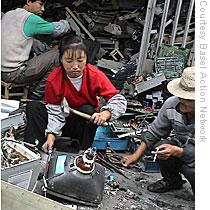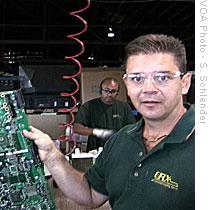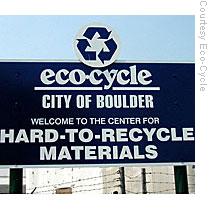voa标准英语2008-US Communities Find Better Ways to Recycle Toxic
搜索关注在线英语听力室公众号:tingroom,领取免费英语资料大礼包。
(单词翻译)
In the United States, the fastest growing type of trash is e-waste: computers, TVs and other electronics. Because many e-waste components1 are toxic2, many communities are striving to recycle them more responsibly. From Boulder3, Colorado, Shelley Schlender reports. |
| Boulder residents sort their e-waste into labeled bins5 at the Hard-to-Recycle Center |
A young man hoists6 his old computer into a recycling bin4 at the Center for Hard-to-Recycle Materials in Boulder, Colorado, and comments, "I like to know there is a center in our town that can do this."
He simply could have dumped his computer in the trash, he says, "but I know that's the wrong thing to do."
Dan Matsch, who manages this recycling center, agrees with a laugh.
"For a lot of people, it feels weird7 to throw a computer monitor in your trash can. It just doesn't feel right, and that's correct," Matsch says. "It shouldn't feel right because there's a lot of heavy metals in electronics."
Boulder's Center for Hard-to-Recycle Materials welcomes not just computers but TVs, cell phones, fax machines and more. This diverts e-waste from landfills, where heavy metals like beryllium, cadmium and lead can leach8 out, contaminating drinking water.
 |
| Women pick through wires torn out of computers. The wires will be burned at night next to the families' homes, releasing cancer-causing fumes9. Guiyu, China. December 2001 |
Matsch also tries to keep e-waste away from companies that ship it overseas, where the parts are often recycled under dangerous conditions.
"Electric cords are piled up and set on fire to burn the plastic insulation10 off so that they can then take the copper11 to a recycler," he explains. "So there's a lot of people are getting very sick because we're sending them our junk in the name of recycling."
Burning plastics creates dioxins, which have been identified as cancer-causing agents.
As for the leaded glass in TV and computer screens, Matsch says when these are thrown away, they increase the risk of brain damage in people who are exposed to them. More are getting tossed these days, as Americans switch to flat-screen monitors and trade in old TVs in advance of the mandatory12 shift to digital TV in February.
 |
| A woman prepares to smash a cathode ray tube from a computer monitor in order to remove the copper-laden yoke13; monitor glass is later dumped in irrigation canals and along the river, where it leaches14 lead into the groundwater. Guiyu, China. December 2001 |
Many consumers try to recycle their old CRTs responsibly. But according to Jim Puckett, founder15 of the watchdog group the Basel Action Network, 60 percent of them end up in shipping16 containers in Hong Kong.
"And most of those in Hong Kong are immediately smuggled17 into mainland China and have gone to a village known as Guyui," he says.
In Guyui, unregulated e-waste recycling has made the water undrinkable, and it's laced the blood of local children with poisonous lead.
The practice is so common, even the city of Denver, Colorado, was fooled by a company that has been shipping e-waste to China instead of recycling it properly. After the company's illegal practice was disclosed in a national television documentary, Michelle Weingarten, Denver's sustainability director, said the city now only will work with e-waste recyclers who have signed a special promise.
"We are making sure that any company that we partner on will be a partner that has signed the pledge by the Basel Action Network to not ship CRTs to developing countries," says Weingarten.
 |
| John Miller18 holds a circuit board that was removed from a discarded computer. Gold, silver and palladium can be recovered from it |
One company that has signed the Basel Action Pledge is Boulder's Center for Hard-to-Recycle Materials. Each week, the drop-off center sends a huge truck loaded with computers, TVs, printers and other electronics to another signer, Denver's Guaranteed Recycling Xperts, where the material is sorted.
Company Vice19 President John Miller says wires and electric cords are sent to a metal company that salvages20 the copper by either chopping the plastic into bits or burning it in incinerators that don't release dioxins. Circuit boards are shipped to a state-of-the-art facility in Belgium that recovers precious metals without releasing toxins21.
As for leaded glass screens, Miller says crews carefully remove them from monitor cases and send them to a company that melts the glass and salvages the lead for car batteries. While this isn't profitable, Miller says it is responsible.
 |
| Many American communities have recycling programs that accept computers and other hard-to-recycle materials |
"The other solution for this glass is for me not to touch it, for me to leave it in a monitor state and for me to sell it to a broker22 for a dollar apiece and send it overseas, where it's going to be improperly23 recycled and cause environmental disasters," Miller says.
E-waste recycling programs in Boulder and other communities across the country are local efforts to fight a global problem, but Sarah Westervelt, with the Basel Action Network, says the U.S. government should also intervene.
"Our government is essentially24 asleep at the switch, and it's very, very challenging for consumers to try to figure out who is doing the right thing," she says.
To help these consumers, the Basel Action Network last month announced plans for an E-Steward Certification Program to audit25 and accredit26 electronic waste recyclers. It will take effect in 2010. In the meantime, the organization will keep pushing for a federal ban on exporting e-waste.
 收听单词发音
收听单词发音 




